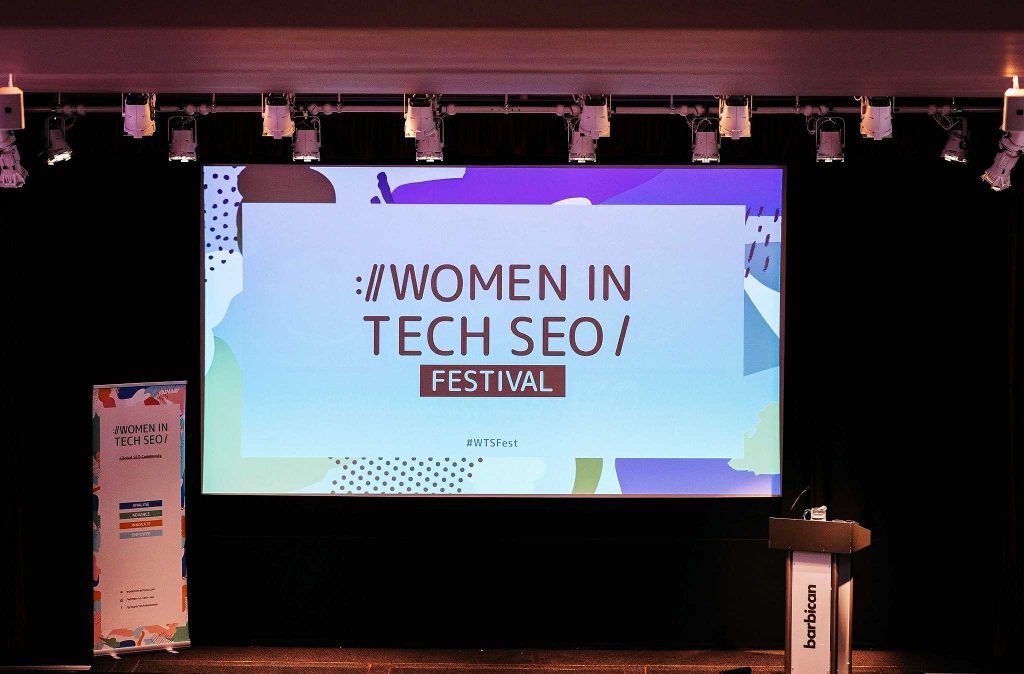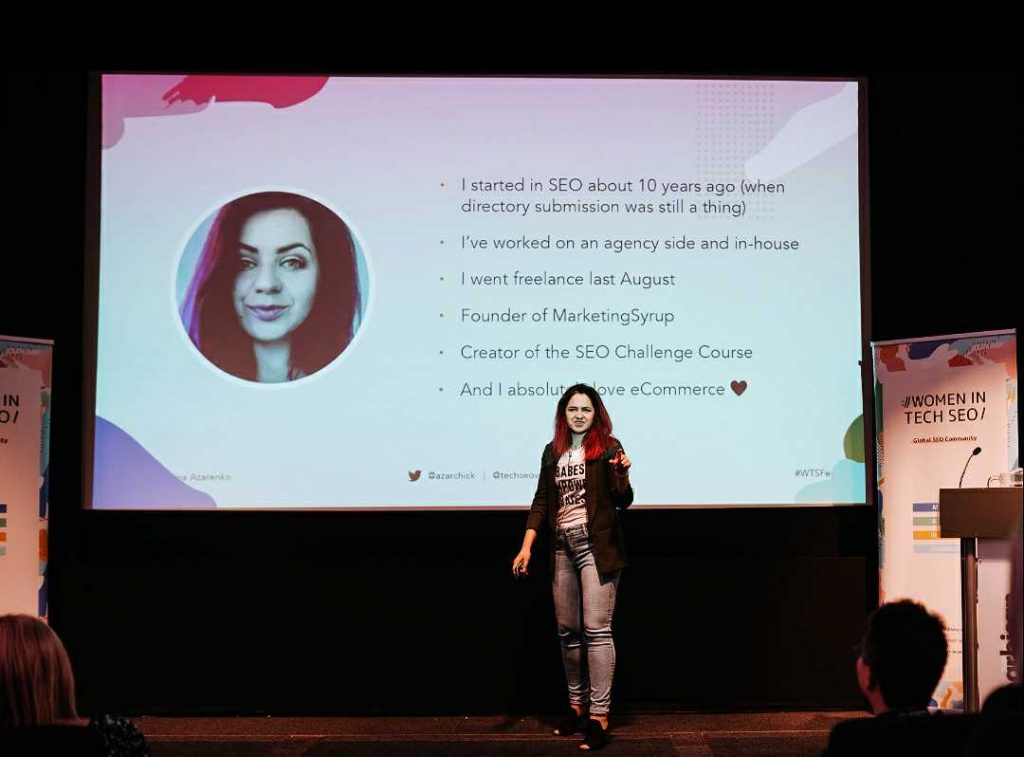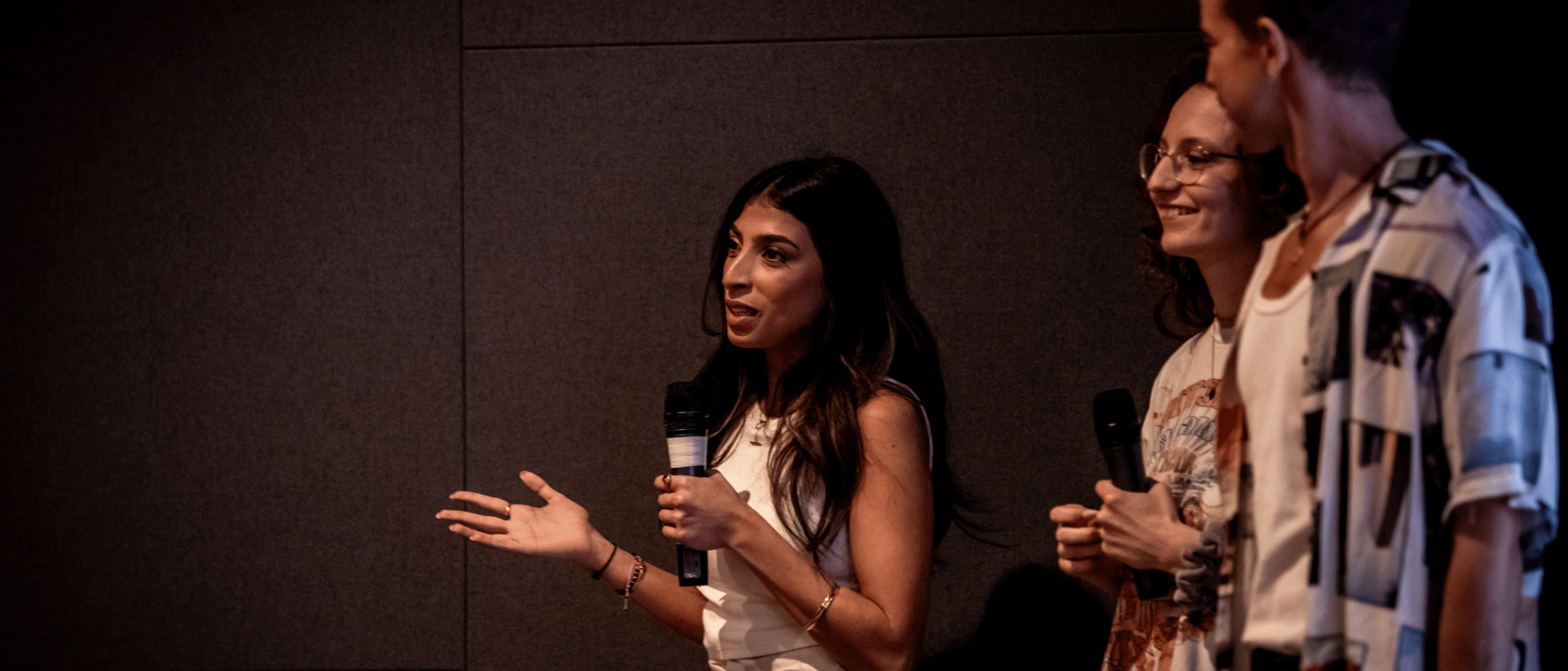On Friday, 6th March 2020, I had the pleasure of attending the first ever Women in Tech SEO conference and the day certainly lived up to my expectations. From tackling Google Sheets and Python to exploring the SEO practices to avoid, the day was filled with a variety of insightful talks.

Below are some quick notes from the talks of the wonderful women at Tech SEO I had the pleasure of listening to.
Roxana Stingu
The first speaker was Alamy’s Roxana Stingu who spoke on the challenges of optimising your site when it is full of high-quality images that you don’t want to compress.
The answer? Optimise everything else!
Stingu provided useful details on optimising page speed and time-to-first-byte (TTFB), with actionable tips like investigating CDNs, checking GZIP, redirects, DNS Lookups, TLS 1.3 for SSL, database optimisation, and considering static caching for pages that don’t change much.
Izzi Smith
Izzi Smith delivered a fascinating talk on entities. Entity optimisation helps machines to deliver better and more relatable responses to human queries. Smith argued for ensuring that your brand entity is well represented in search; she also went through the key things that matter including authority, relatedness, and priority.
Emily Potter
Emily Potter from Distilled showed us that a lot of SEO ‘best practices’ actually harm traffic to your site, including that “91% of meta description changes have no detectable impact, particularly for large sites.” This was evidenced by one brand removing meta descriptions from their website pages to find that Google’s auto generated ones had more impact.
Another example Potter used was that through fixing breadcrumbs schema, she’d seen this have a negative impact when the SERPs changed. It was highlighted that the current page initially having valid schema received a loss in clicks. Hence, we need to accept that users are hard to predict and consider swapping best practice for user experience – be user-centric!
Ruth Everett
Deepcrawl’s Ruth Everett talked about using Python, learning new things and trying them out as a fun part of SEO. She introduced how Python can help technical SEOs by automating, extracting and analysing data. Encouraging us all to have a think of what can possibly be automated and look for an existing script, or learning to write your own! Moreover, through using Python she explained how SEOs are able to make better decisions, allowing more time to spend on important tasks. One example that was particularly interesting was an alt text generator for image optimisation.
Python is also now being used to power machine learning.
Aleyda Solis
Aleyda Solis from Orainti presented on the technical SEO challenges with marketplace sites. Key points were:
- It’s not about indexing more pages, but rather it’s about indexing the right pages
- It is not about traffic but about money-growth-profit.
- It is also important to create best practice guidelines and processes for venders
- Don’t allow products to be listed twice by the same vender
- Each product should not be listed in an indexable facets path. Don’t link to these from canonicalised URLs.
Also, Solis highlighted ways in which to deal with out of stock products, including:
- Provide an option to users to be notified when the product is restocked
- Redirect to relevant category page for users to discover other products
- Redirect the page to a similar product
Mira Inam
Erudite’s Mira Inam’s presentation was about demonstrating the worth of your SEO campaigns. The need to create impact reports to demonstrate the value of changes was also highlighted, as well as ensuring that pages are being tracked so that useful data insights can be obtained.
Kristina Azorenko
Kristina Azorenko from MarketingSyrup delivered a presentation on how to scale SEO for e-commerce. Category pages are the most visited type of page on e-commerce sites. She talked through her 8-step framework for creating e-commerce category pages at scale. These included creating top-level category and filter pages, and ensuring that you don’t end up creating pages that are likely to be thin on content.
8 steps for e-commerce facet page framework:
- Carrying out keyword research
- Use existing filters to base facets on
- Define the rules of facets
- Canonicalization rules for facets
- Internal linking to facets
- Optimise facets
- Test everything
- Improve

Hannah Rampton
SEO consultant Hannah Rampton presented an inspiring talk on the useful ways in which you can manipulate and use data in Google Sheets and using useful resources such as Search Console Explorer Sheet.
The beauty of using functions to manipulate your data is very underused, but it does offer great benefits and creates more capacity to speed up tasks and focus on more important things. This includes using Google Sheets as an easier and quicker way of categorising keywords, as well as presenting data through the use of sparklines which can assist for showing trends.
The last few sessions consisted of brilliant women sharing their empowering stories. Hannah Smith talked about going freelance and the fraud police, sharing honest insights into her experience including advice she received from people, bits she ignored and those she found really helpful. Stacey MacNaught recommends that for improving productivity, you should:
- Assess your productivity hours and work around them if you can
- Utilising the Pomodoro technique (25 minutes stints with 5 minutes break) to enhance focus
- Identify what slows you down – e.g. imposter syndrome
And finally, wrapping things up for the day was Kirsty Hulse, a fantastic advocate for women in the industry and leader of incredible confidence workshops.
Finally, here’s a summary of my key Tech SEO take-aways from the day:
- Page speed is a ranking factor:
- When image compression is not an option, there are alternatives:
- Optimise for time-to-first-byte (TTFB)
- Network latency – use a CDN if possible
- GZIP compression is great – make the most of it
- Reduce the number of redirects
- DNS lookups – get a faster DNS provider, use DNS cache or reduce the number of domains
- SSL – use TLS 1.3
- For dynamic content, use static caching
- When image compression is not an option, there are alternatives:
- Analyse your existing filters and determine which will become the basis for your indexable facet pages. Create top-level category and filter pages.
- Ensure to monitor keywords, set KPIs, set tracking (GTM), and carry out impact reporting.
- It’s not about indexing more pages but indexing the right pages.
- Build up powerful entities and connections
- Python can be very useful in SEO for automation, extracting and analysing data
- Swap best practice for user experience


